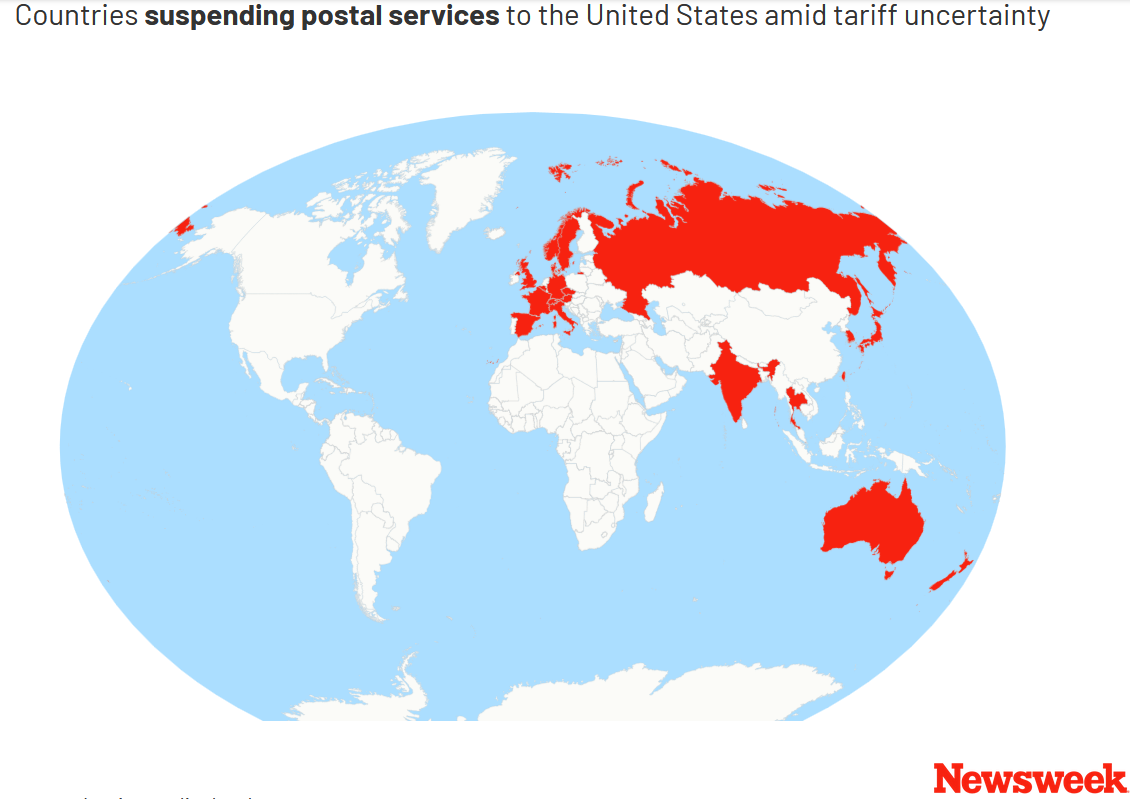Map of Countries Suspending Postal Services to the US


David Chen
Data Visualization Specialist
David Chen is an expert in transforming complex geographic datasets into compelling visual narratives. He combines his background in computer science ...
Geographic Analysis
What This Map Shows
This map highlights the countries that have suspended their postal services to the United States as of August 26, 2025, amidst ongoing tariff uncertainties. The visualization provides a clear overview of these nations, allowing us to understand the geopolitical and economic factors at play. Tariffs, which are taxes imposed on imported goods, can have significant repercussions on various sectors, including postal services. The map illustrates which countries have chosen to halt their postal operations, reflecting their response to the evolving trade landscape.
Deep Dive into Postal Services and Tariffs
Postal services have always played a crucial role in global communication and commerce. They facilitate the exchange of goods and information across borders, helping to connect people and businesses. However, the intricate web of international trade is heavily influenced by tariffs and trade policies. Tariffs can disrupt these services by increasing costs and creating uncertainty in the marketplace.
In recent years, the discourse around tariffs has intensified, particularly between major economies. The United States, as one of the world's largest consumers, often finds itself at the center of such discussions. Countries that suspend postal services to the U.S. may do so for various reasons, including retaliatory tariffs or concerns over trade imbalances. Interestingly, these suspensions can also reflect broader political tensions, which can escalate rapidly in an era of global interconnectedness.
For instance, a country may decide to halt postal operations as a form of protest against U.S. policies or as part of a larger strategy in international negotiations. This not only affects the flow of mail but also impacts e-commerce and the delivery of goods that rely on postal networks. Have you noticed how the rise of online shopping has led to an increased dependence on postal services? When these networks are disrupted, it can lead to significant delays and inconveniences for consumers and businesses alike.
Moreover, the impact of these suspensions isn’t uniform across all countries. Some nations may have strong alternative logistics frameworks that can mitigate the effects, while others may struggle with the sudden loss of access to U.S. markets. This brings us to the question: how do these postal service suspensions affect international relationships and economic stability?
Regional Analysis
When examining the map, it's crucial to consider regional contexts. For instance, countries in Europe and Asia may have different motivations and consequences for suspending postal services. In Europe, nations like France or Germany may be more inclined to maintain communication channels due to their established trade relationships with the U.S. However, countries with emerging economies or less robust postal infrastructures may be more vulnerable to the impacts of tariff-related suspensions.
In Asia, countries such as China and India may have different approaches based on their unique economic strategies. China, being a significant player in global trade, may weigh the benefits of maintaining postal services against the potential for retaliatory measures. Conversely, smaller nations that rely heavily on remittances or trade with the U.S. may find the suspension detrimental, compelling them to navigate a complex political landscape to reinstate services.
Interestingly, this map does not merely represent a moment in time but highlights a dynamic and evolving situation. Countries may reestablish postal services as negotiations progress or as political climates shift.
Significance and Impact
Understanding the implications of countries suspending postal services to the U.S. is essential in today's interconnected world. These actions can serve as indicators of larger geopolitical trends and tensions. For individuals and businesses, the immediate consequences are felt in the form of delayed mail and disrupted logistics, but the broader implications ripple through international relations and trade agreements.
The ongoing tariff uncertainty raises pertinent questions about the future of global trade. As countries navigate these complexities, we may witness a shift in how postal services operate, potentially leading to more localized or alternative delivery systems. Have you considered how these changes might influence the future of e-commerce and global communication? As we look ahead, it becomes clear that the landscape of international trade and postal services will continue to evolve in response to these economic challenges.
In conclusion, this map serves as a reminder of the intricate connections between geopolitics, economy, and everyday life. The suspension of postal services to the United States is not just about mail; it's a reflection of broader trends that can shape the way nations interact in the years to come.
Visualization Details
- Published
- August 26, 2025
- Views
- 130
Comments
Loading comments...